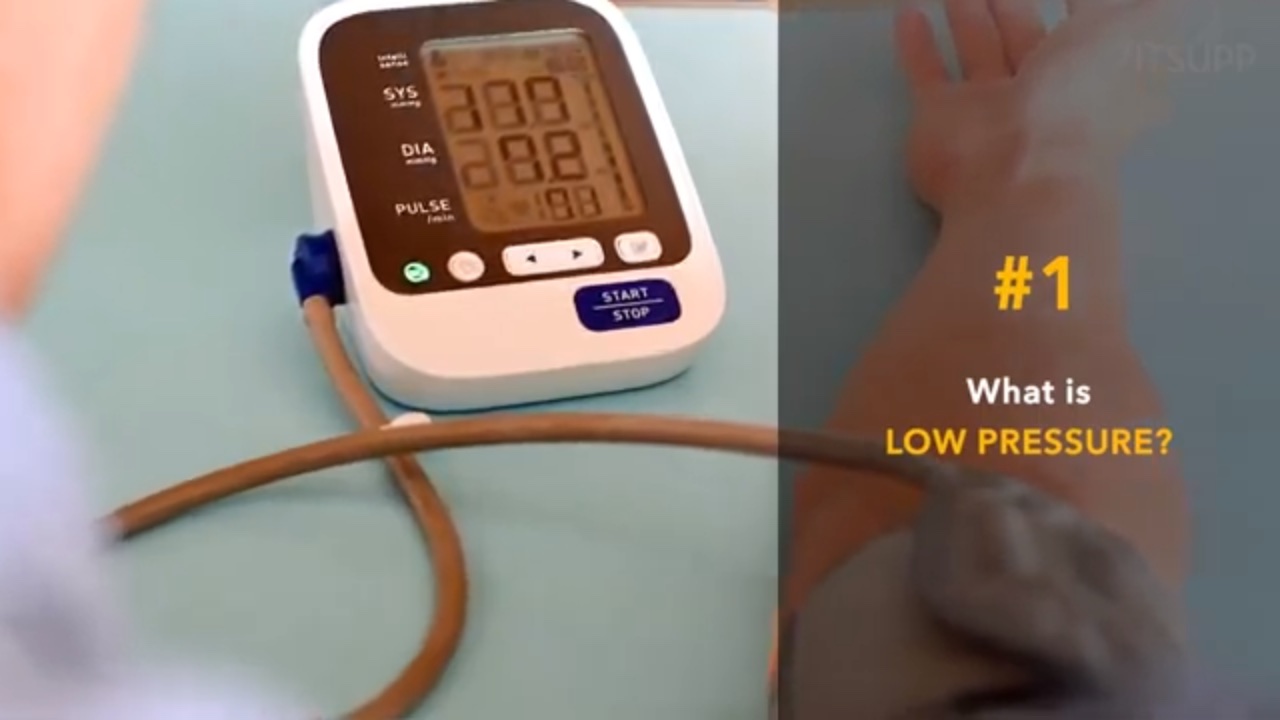When your blood pressure remains lower than average for a long time, you have Low blood pressure or hypotension.
Low pressure is also called hypotension. If your systolic/diastolic readings are consistently less than 90/60 mm Hg over a number of weeks, then you probably have hypotension or low pressure.
While usually, it does not pose a problem, severe low pressure can lead to a lot of complications- especially for the elderly.
So what signs should you watch out for if you have low BP? Here is a video on High Blood Pressure. Watch till the end, and you will learn about some surprise habits that can help you if you want to manage hypertension.
However, it is always good to check your BP regularly. There is no demarcation as to what is the cut off for low pressure on a day-to-day basis. However, if your blood pressure drops suddenly to alarming levels, you must look for immediate medical intervention. This is especially true for the elderly or people who are suffering from chronic illnesses.
Contents
Why you should pay attention to low BP?
While usually low pressure in healthy people is not serious, a sudden drop in pressure may reduce blood supply to vital organs like the brain, kidneys and liver. This may trigger severe complications. Low BP can also be a sign of underlying problems.
It may indicate problems with your heart, anaemia or neural problems. If you experience frequent drops in BP or get fainting spells, dizziness or coldness in hands and feet- you must get a doctor’s opinion without delay.
Signs of low BP
While most people with hypotension live without experiencing any symptoms, a sudden drop in BP can be indicated by signs like
- Light-headedness
- Dizziness
- Feet and hand getting cold
- Getting chills or feeling cold
- Fainting
- Exhaustion
- Excess thirst
- Rapid breathing or shortness of breath
- Dehydration
- Blurred vision
What causes low blood pressure?
Blood pressure is influenced by many factors. They are:
- Ageing
- Genetic factors
- Pregnancy
- Low blood sugar
- Hormonal problems like hyper or hypothyroidism
- Arrhythmia
- Heart failure
- Exhaustion
- Heatstroke
- Liver disease
- Medications for diseases like Parkinson’s disease
- Trauma or blood loss
- Low body temperature
- Severe dehydration from diarrhoea or vomiting
- Severe allergic reaction like anaphylaxis
- Severe blood infections like Sepsis
- Addiction issues like alcoholism or drug abuse.
Senior citizens with low BP- a cause for concern
While it is normal for blood pressure to rise or even fall with age, pay attention if you experience a sudden drop in BP. This may indicate problems with your heart or nervous system or even a dangerous drop in blood sugar levels. Low BP may also result from drug interactions. Consult your doctor to know if you need to change your drug dosage or need a change in prescription.
Drug interactions that lead to low BP
Medications for several conditions may lower your BP. These may be medications for:
- Parkinson’s disease
- Medicines to treat hypertension
- Anti-anxiety medicines
- Diuretics
- Painkillers
- Anti-depressants
- Medicines used before or after surgery If you feel exaggerated symptoms, or experience them for a long time, talk to your doctor to know if you need to change your medications.
What is postural hypotension? Why should you pay attention to it?
Sudden drops in BP often happens when someone stands up from a sitting position or sits up from laying down. This is known as postural hypotension. Sustained postural hypotension is regarded as a serious problem- because it indicates that your cardiovascular or nervous system is unable to adapt to sudden changes. Normally, when you change posture, blood pools in your feet. However, the brain signals the heart immediately to beat faster, so that blood supply to the brain remains uninterrupted. Frequent spells of postural hypotension episodes indicate that the heart is unable to pump blood properly. This may lead to problems and even lead to fainting.
Treatment for low blood pressure
There is as such no treatment of low pressure. However, if you experience a severe fall in BP or experience a shock, a few things can help you: 1. Your doctor may prescribe you some drugs for your condition. 2. If BP falls due to dehydration, your doctor may administer intravenous dips. 3. If your BP is falling due to trauma or blood loss, you may need blood transfusion. 4. If fall is BP is due to any sudden heart problems, you may require adrenaline or norepinephrine shots. These hormones help the heart to beat faster so that blood supply to vital organs is not interrupted.
How to manage low blood pressure?
Like hypertension, chronic hypotension cannot be “cured” as such. However, you can definitely manage your BP. Here are a few tips:
- Follow a healthy diet. Do not deprive yourself of essential nutrients. Make sure you are having balanced meals.
- Depending on your personal health needs, you may be required to increase your salt or sugar intake.
- Drink lots of fluids. Dehydration can trigger severe low pressure. Make sure you have enough electrolytes.
- Lead and active life. Exercise regularly. A sedentary lifestyle affects your stamina. If you stay active, your heart stays healthy, and your overall health improves. This helps your body adapt to sudden changes faster.
- Avoid exposure to allergic foods or substances. They may lead to severe reactions or loss of fluids, which can lead to a rapid fall in pressure.
- Avoid lifting heavy weights or stressful work.
- Do not keep sitting, standing or lying down for an extended period of time without moving. Try to change your positions and take active breaks regularly.
- Eat food at regular intervals and don’t skip meals.
- Avoid taking hot showers. This may come as a surprise, but hot water or steam in saunas may actually lead to losing more moisture from your body. This may lead to dizziness and also make your pressure drop.
Low blood pressure- things to keep in mind
While low BP is not considered as such, it is worrying if you see your BP fall over an extended period of time or experience a sudden fall in BP. Hence, it is recommended to check your BP regularly. If you find any abnormal readings or see your BP fall suddenly, talk to your doctor immediately. Also, if you experience regular episodes of dizziness, shortness of breath, exhaustion or other symptoms like blurred vision, you must consult your doctor. Remember, if you follow your doctor’s instructions, monitor your BP regularly and follow a healthy lifestyle, you can stay active and happy.


